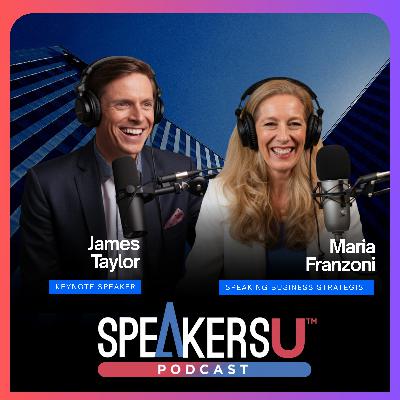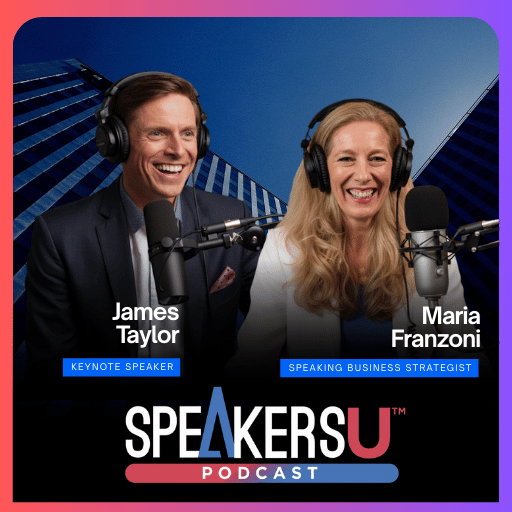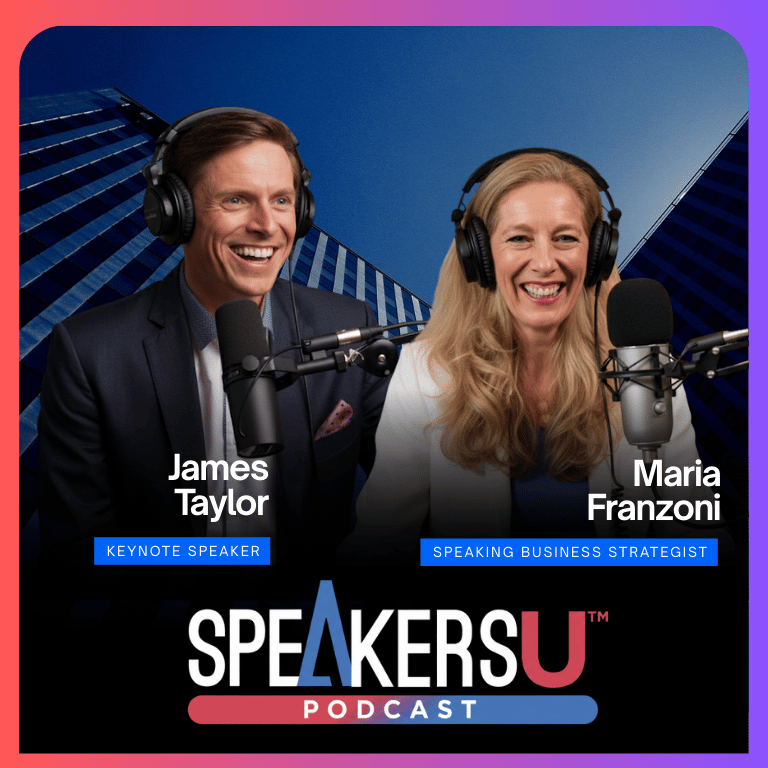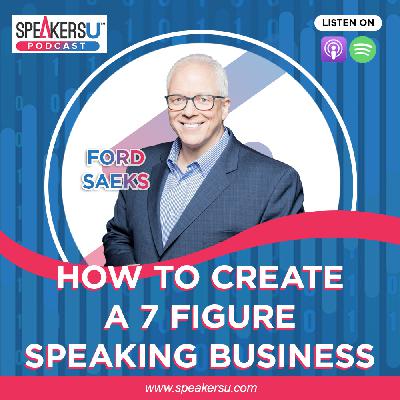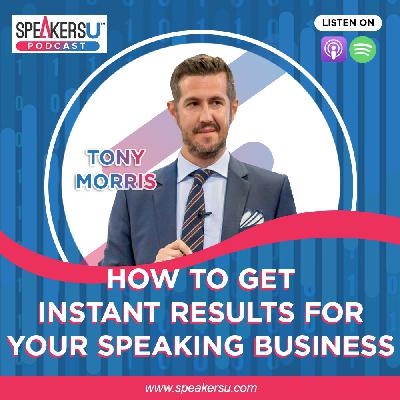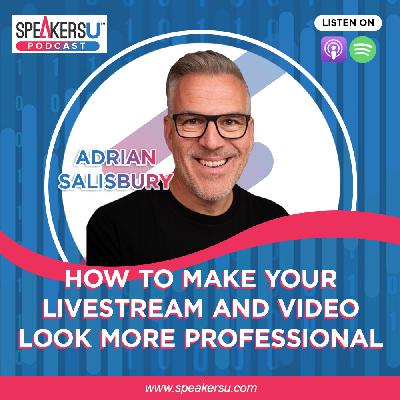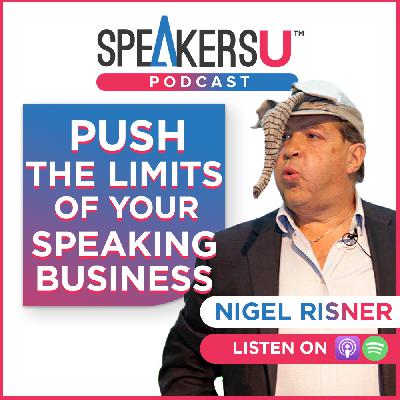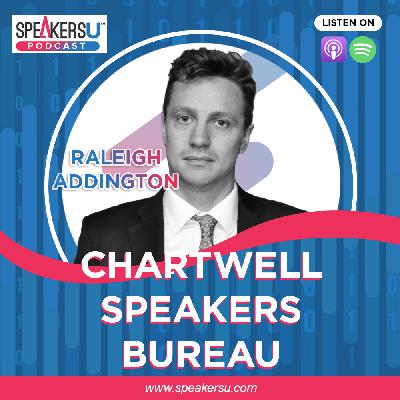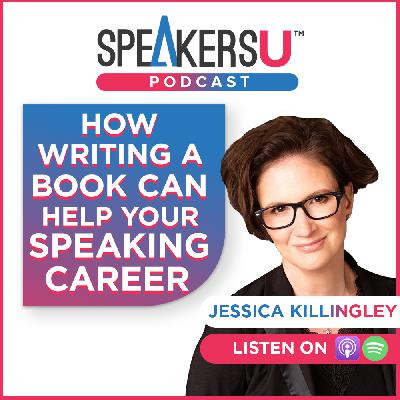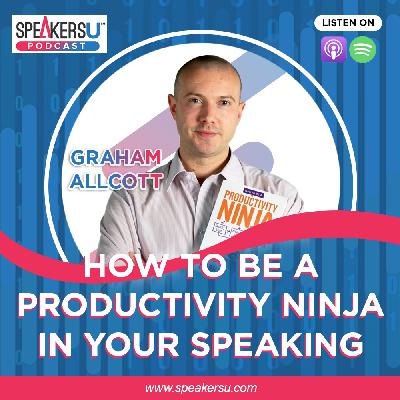Discover SpeakersU Podcast with James Taylor
SpeakersU Podcast with James Taylor

SpeakersU Podcast with James Taylor
Author: James Taylor - Keynote Speaker
Subscribed: 37Played: 774Subscribe
Share
© SpeakersU
Description
SpeakersU Podcast host James Taylor brings you weekly speaker training, interviews and public speaking tips. You'll learn strategies on how to launch and grow your professional speaking business. The SpeakersU Podcast will teach you how to become a better public speaker and ways to get booked to travel the world as a highly-paid keynote speaker. You'll go behind-the-scenes as innovation keynote speaker, creativity expert and speaking business coach James Taylor travels the world speaking at global conferences and interviewing top leadership speakers, business speakers and speaker bureaus. Subjects covered in the SpeakersU Podcast include how to become a top keynote speaker, motivational speaker or public speaker, working with speaking bureaus, how to make money speaking, speaker marketing automation, selling your speaking, joining speakers associations, improving your communication skills, presentation training basics, and how to become a successful professional speaker.
154 Episodes
Reverse
In this episode of the SpeakersU Podcast, James Taylor and Maria Franzoni pull back the curtain on the world of top speaker bureaus — how they work, what they look for in speakers, and how to build mutually beneficial relationships that generate bookings. Maria draws on decades of experience running one of Europe's most respected bureaus to explain how agents think, what differentiates a bookable speaker, and the dos and don'ts that every professional should know. James adds his perspective as a speaker represented by leading bureaus around the world, revealing how he collaborates with agents, builds trust, and stays top-of-mind. Whether you're just starting out or already on the international circuit, this episode will help you understand the economics, etiquette, and psychology of working successfully with speaker bureaus. Key Takeaways Bureaus are partners, not promoters – Their job is to serve their clients, not to manage your calendar. Be easy to sell – Have clear positioning, strong video, up-to-date assets, and a defined fee range. Stay top of mind – Regular updates, newsletters, and personal touches help agents remember you. Trust takes time – A bureau relationship is earned through reliability and professionalism. Never bypass a bureau client – Always respect existing relationships and contracts. Understand their economics – Bureaus work on commission; help them justify recommending you. Differentiate your topic – Relevance, clarity, and credibility make you stand out in their database. Be bureau-ready – Fast response times, accurate details, and flexibility build confidence. Support their success – Make them look good in front of their clients, and they'll champion you again. Memorable Quotes "A bureau's client is the end client — not you. Understand that, and you'll have better relationships." – Maria Franzoni "Don't expect bureaus to build your business; help them sell you by giving them reasons to." – James Taylor "The easiest speakers to book are the ones who make agents look brilliant." – Maria Franzoni "Relevance and reliability will get you booked again and again." – James Taylor "Treat bureaus as partners — not miracles." – Maria Franzoni Episode Timestamps 00:00 – Welcome and catching up on travel and client projects 01:52 – What exactly is a speaker bureau? 03:28 – How bureaus differ from speaker agents or managers 05:16 – What bureaus really look for when recommending a speaker 07:32 – The economics of bureau commissions and client service 09:18 – How to make yourself "easy to sell" 11:40 – The power of positioning and clarity in your topic 13:05 – Dos and don'ts when approaching a new bureau 15:33 – Why trust is the currency of the bureau–speaker relationship 17:26 – Handling multiple bureaus without conflict 19:47 – Updating bureaus and keeping them engaged 22:09 – Common mistakes speakers make when working with bureaus 24:34 – Case studies: speakers who get rebooked again and again 26:42 – How to support your bureau before, during, and after events 29:15 – Tech & tools of the week for bureau collaboration 31:20 – Final thoughts and listener questions 👉 Have a question or suggestion for James and Maria? Email hello@speakersu.com
In this episode of the SpeakersU Podcast, James Taylor and Maria Franzoni tackle one of the biggest questions every professional speaker faces: how much should I charge? Drawing on decades of experience as a bureau owner, Maria explains how to set your keynote fee, when to raise it, and why you should never discount. James shares insights from his own speaking business — including how he tests price levels, manages international vs. virtual fees, and negotiates without losing value. Together they explore the psychology, strategy, and market realities of pricing yourself in the global speaking industry. Whether you're just starting out or ready to move into a higher fee bracket, this episode is packed with real-world advice on finding your sweet spot, building fee integrity, and communicating your value with confidence. Key Takeaways Value, not time – Your fee reflects outcomes and expertise, not minutes on stage. Know your market – Corporate, education, and government sectors have very different budgets. Location matters – Fees vary across regions; the U.S. and Middle East typically pay more than the U.K. Profile sets price – Seniority, credibility, and positioning determine perceived value. Don't publish your fees – Keep flexibility to tailor pricing per client and market. Raise fees when there's no pushback – If you're closing 75% of inquiries, your fee is too low. Virtual vs. in-person – Treat virtual strategically; it can be equal or higher depending on effort and impact. Never discount — negotiate – Exchange value (video footage, PR, introductions) instead of lowering price. Fee integrity matters – Keep consistency across bureaus and direct clients to avoid confusion. Strategic pricing evolves – Adjust fees as your demand, reputation, and market position grow. Memorable Quotes "Your fee isn't for 45 minutes on stage — it's for everything that got you there." – Maria Franzoni "If 75% of people are saying yes, your fee's too low." – James Taylor "Never discount. Negotiate." – Maria Franzoni "Make your website look like a $10,000 speaker even if you charge $5,000." – Maria Franzoni "Relevance, reliability, and results — that's what earns higher fees." – James Taylor Episode Timestamps 00:00 – Welcome and catching up (dogs, weather, and winter settings) 02:41 – Why fee setting is like finding your temperature sweet spot 03:30 – What determines your starting keynote fee 05:08 – Industry and market differences in speaker pricing 06:59 – Global markets: U.S., U.K., Europe, Middle East, and Australia 07:49 – Profile, credibility, and client type as key price drivers 08:45 – Which industries pay best (and which don't) 10:10 – Using event clues (like hotel choice) to gauge budget 11:25 – Should you publish your fees online? 13:12 – Pricing psychology: how travel, time, and opportunity cost affect value 14:05 – Website positioning and showreel strategy 16:07 – When and how to raise your fees confidently 17:23 – The "75% rule" and psychological pricing mindset 18:31 – Fee communication and working with bureaus 20:23 – Virtual vs. in-person fees: strategy, value, and structure 23:45 – Hybrid models: longer, interactive virtual formats 25:49 – International pricing strategies and personal preferences 27:24 – The post-pandemic fee landscape 28:22 – Net vs. gross fees and bureau commissions 31:01 – Why the "D-word" (discount) is banned forever 31:45 – How to negotiate extra value instead of discounting 33:24 – Creative negotiations: travel perks, intros, and even gambling chips 33:57 – Final tips: researching competitors and bureau listings 34:35 – James' Blue Ocean strategy for finding pricing gaps 35:48 – Wrap-up and next episode preview Have a question or topic suggestion for James and Maria? Email hello@speakersu.com
In this episode of the SpeakersU Podcast, James Taylor and Maria Franzoni dive into one of the biggest decisions every professional speaker faces — whether or not to write a book. With reading habits changing and attention spans shrinking, is publishing still worth it? Maria shares what she learned from writing The Bookability Formula, including how a book clarifies your thinking, protects your IP, and raises your authority. James discusses his upcoming SuperCreativity book, why he waited five years before writing it, and how books can elevate your speaking brand. Together they explore the pros and cons of traditional vs. self-publishing, how to use your book as a marketing tool, and creative ways to launch and promote it. Whether you're a new or established speaker, you'll discover why books still matter — and how to make yours work for your business, your brand, and your audience. Key Takeaways Books clarify thinking – Writing forces structure and helps you refine your core message. Authority comes from authorship – The word "authority" literally begins with "author." Timing matters – Don't write too early; live your content first. Books as business cards – A book opens doors and elevates positioning, even if it doesn't make big money. Hybrid publishing is a smart middle path – Keeps quality control without losing autonomy. Tie your launch to an event – Use an existing audience for maximum visibility. Give books freely – Strategic giveaways amplify goodwill and social proof. You must market it – Promotion, interviews, and podcasts are on you, not your publisher. AI audiobooks are here – Tools like Eleven Labs can narrate your book in multiple languages. Memorable Quotes "Writing a book unravels your thinking — it turns spaghetti into structure." – Maria Franzoni "A book is the summation of years of ideas, handed to you for £20. That's incredible value." – James Taylor "Authority comes from author. A book changes how clients perceive you." – Maria Franzoni "You don't need a book to be a successful speaker — but it can unlock a higher level of opportunity." – James Taylor "Attach your book launch to an event that already has your perfect audience." – Chris Gardner (via Maria Franzoni) Episode Timestamps 00:00 – Welcome & why reading is declining 01:16 – Why Maria wrote The Bookability Formula 02:15 – Books as clarity tools and IP protection 04:01 – James on the value of books for idea transfer and legacy 05:47 – Speaking first, writing later – when to start your book 07:09 – Avoid writing too early; live your material first 08:23 – How writing affects your speaking income short-term 09:38 – Books as brochures and positioning tools 10:59 – How bureaus view speakers with books 13:44 – Branding your book and keynote under one concept 15:01 – Why bureaus love books but don't profit from them 16:54 – Micro-books and multi-series publishing 17:46 – Traditional vs hybrid vs self-publishing 18:12 – Finding a publisher who respects your voice 19:36 – Owning foreign rights and global expansion 21:27 – The marketing reality: sales depend on you 22:08 – David Allen's 25-year book promotion discipline 23:08 – Maria's tip: attach your book launch to an event 25:02 – Free books as social-media gold 25:50 – James' tool: Eleven Labs for AI audiobooks and voiceovers 26:58 – Closing thoughts and listener questions 👉 Have a question or topic suggestion for James and Maria? Email hello@speakersu.com
In this candid episode of the SpeakersU Podcast, James Taylor and Maria Franzoni tackle one of the most dangerous traps for professional speakers — ego. While confidence is essential to step on stage, unchecked ego can sabotage client relationships, damage reputations, and even end careers. Maria shares shocking true stories of "speakers behaving badly," from diva demands and drunken disasters to midnight tantrums over hotel rooms. James reveals how cultural differences, gender perceptions, and even microphone preferences can blur the line between professionalism and arrogance. Together they explore how to stay grounded, easy to work with, and respected — even when success and attention start to inflate your self-image. If you've ever wondered where confidence ends and ego begins, this episode offers hard-won lessons, cautionary tales, and practical ways to keep your feet firmly on the ground. Key Takeaways Confidence ≠ arrogance – A healthy ego gets you on stage; an inflated one gets you blacklisted. Be easy to work with – Kindness to AV teams, organisers, and staff is remembered (and shared). Do your own briefing calls – Never outsource relationships that build trust with clients. Ego destroys reputations fast – Word travels quickly among bureaus and event planners. Cultural context matters – What reads as confidence in the US may look like arrogance in the UK. Boundaries vs. bad behaviour – Riders and technical requests are professionalism, not ego. Stay grounded – Family check-ins, gratitude, and humility keep you level when success rises. Memorable Quotes "Speakers need ego to get on stage — but when it tips into arrogance, it can destroy your career." – Maria Franzoni "Our job is to be champions for our craft, not divas of the greenroom." – James Taylor "Do your own briefing calls — if Neil Armstrong could, so can you." – Maria Franzoni "Confidence is caring about the craft; ego is caring only about yourself." – James Taylor "You can't control how others treat you, but you can control how you treat everyone around you." – Maria Franzoni Episode Timestamps 00:00 – Welcome and playful banter about podcast "coolness" 01:20 – Why ego deserves its own chapter in The Bookability Formula 03:07 – When ego makes speakers inflexible on stage timings 04:18 – The ripple effect of bad behaviour on AV and event teams 06:29 – How negative energy travels fast between events and bureaus 07:15 – "Speakers behaving badly" – examples from Maria's agency days 09:07 – Do your own briefing calls (and why Neil Armstrong did his) 10:45 – Cultural and gender differences in how ego is perceived 12:13 – When high standards aren't arrogance but professionalism 13:20 – Midnight hotel tantrums and balcony meltdowns 14:08 – Respect the client's exhaustion – empathy over entitlement 16:42 – Drunken speeches and recycled stories: reputations ruined 18:04 – Tracking your material to avoid repetition and mistakes 19:44 – Cultural nuances: big intros that work in the US flop in Europe 20:24 – Crossing ethical lines: relationships and reputation at events 21:56 – Zig Ziglar's "five calls a day" rule to stay grounded 23:20 – Tips & tools of the week: elected-office speaking practice and portable AI recorders 27:25 – Future of AI speaker assistants — "Digital Maria Franzoni?" 27:52 – Wrap-up, humour, and listener invitation Have a question or story for James and Maria? Email: hello@speakersu.com
In this episode of the SpeakersU Podcast, James Taylor and Maria Franzoni dig into one of the least glamorous but most important parts of every speaking business — speaker contracts. Whether you're new to professional speaking or a seasoned pro, understanding how to protect your intellectual property, ensure timely payment, and manage client expectations can make or break your business. Maria explains why every speaker should have their own agreement rather than signing the client's, outlines the three most essential contract clauses, and shares tips learned from decades of managing high-profile speakers. James discusses real-world examples, from green riders and recording rights to payment terms and handling last-minute "scope creep." Packed with practical templates, cautionary tales, and negotiation tactics, this episode will help you get paid on time, protect your content, and build lasting professional relationships with clients and bureaus. Key Takeaways Have your own contract – Don't rely on the client's; be in control of your terms. Three must-have clauses – Payment terms, cancellation terms, and recording/IP rights. Scope creep is real – If the client adds panels, dinners, or extra work, renegotiate. Never travel without payment – Aim for full balance 30 days before the event. Use "firm offer" forms – Simplify admin and confirm all details before committing. Protect your recordings – Approve edits, restrict public use, and get a copy of all footage. Green riders matter – Add sustainability or ethical clauses that reflect your values. Be clear on travel and security – Define who pays, how you travel, and what safety steps apply. Weird rider stories – From "no journalists allowed" to 10 a.m. wine, the industry has seen it all. Memorable Quotes "Speakers should have their own contract — not the client's." – Maria Franzoni "The date is the contract. If it changes, renegotiate." – Maria Franzoni "Don't step on stage until 100 percent of your fee has been paid." – James Taylor "You can't control when a client pays, but you can control when you travel." – Maria Franzoni "Add the day of the week next to the date — it saves endless confusion." – Maria Franzoni "Keep your contracts simple enough to understand, but strong enough to protect you." – James Taylor Episode Timestamps 00:00 – Welcome & catching up on dogs, lunches, and life balance 01:47 – Why contracts matter (and the legal disclaimer) 03:22 – What hasn't changed in speaker contracts for 25 years 05:14 – The three essential clauses every speaker needs 06:52 – Payment schedules and why balance should be due 30 days before 08:09 – Firm offer forms vs. booking forms and confirmation letters 11:07 – Common negotiation points and dealing with slow-paying clients 12:35 – Accepting credit cards – yes, but add the surcharge 14:27 – Late-payment clauses and procurement headaches 15:58 – Scope creep: when clients add panels, dinners, or sponsor meetings 17:22 – Recording and IP rights: how to protect your material 20:21 – What to allow (and not allow) for public or internal use 23:19 – Editorial approval and licensing fees for wider distribution 25:50 – Using a bureau's contract to simplify client onboarding 27:03 – Travel clauses and buyout options 29:34 – The rise of the Green Rider and sustainable speaker travel 32:17 – Security clauses – from former heads of state to practical travel safety 36:08 – Craziest contract clauses: no journalists, no competitors, no flashes 39:15 – Funny (and alarming) rider requests from celebrity speakers 42:12 – Templates, tips, and the "add the day of the week" trick 43:56 – Digital signatures: Hello Sign, Echo Sign, and Google Docs e-signing 45:00 – Wrap-up and listener invitation for contract questions Resources & Links Free Speaker Contract Template: speakersu.com/contracts (example placeholder) Email questions or ideas: hello@speakersu.com Follow James Taylor & Maria Franzoni on LinkedIn for daily speaking tips
In this episode of the SpeakersU Podcast, James Taylor and Maria Franzoni explore one of the most important challenges for professional speakers: how to stay relevant in a rapidly changing marketplace. Maria explains why relevance to a paying market is the first element of her Bookability Formula and how speakers can identify what audiences will need today—and in five years' time. James shares how he blends perennial topics like creativity with fast-moving ones like AI, and why staying a few steps ahead of clients keeps him in demand. From industry reports and boardroom insights to experimenting with new keynote content and testing topics with the market before creating them, this conversation is packed with strategies to help speakers stay visible, booked, and valued in an ever-evolving industry. Key Takeaways Relevance drives bookings – It's the #1 factor in Maria's Bookability Formula. Think five years ahead – Use strategy insights to prepare for how industries and audiences will evolve. Blend perennial and trendy topics – Pair evergreen skills (creativity, leadership, resilience) with emerging trends (AI, tech, demographics). Listen more, talk less – Relevance often comes from asking the right questions in discovery calls. Experiment before you build – Test keynote ideas, topics, or programs in the market before investing time and money. Differentiate by audience – Tailor your pitch for C-suite, event professionals, and bureaus, as each values relevance differently. Stay close to your industry – Associations like MPI and global markets (US, Europe, Asia) often signal future trends. Memorable Quotes "The most important element of being bookable is relevance to a paying market." – Maria Franzoni "Don't wait for five-year plans—ask what the world will look like in five years and move your speaking to match." – James Taylor "Sell it before you create it. The market decides what's relevant, not you." – Maria Franzoni "Relevance isn't just your topic—it's how you present it to different stakeholders." – James Taylor Episode Timestamps 00:00 – Welcome and updates: group sessions and risky live AI music demos 04:24 – Why staying relevant matters: Maria's Bookability Formula 05:18 – James on blending perennial topics with fast-changing ones 06:45 – Strategy lessons from Eric Schmidt: think five years ahead 07:34 – Maria on LinkedIn Learning and WEF reports as future-skills guides 09:10 – How James tracks trends using board minutes, Gartner reports, Reddit 11:11 – Tech examples: AR glasses, live facial recognition, event tech 14:54 – Staying close to the meetings & events industry for insights 16:22 – Meeting professionals shaping the future of conferences 18:48 – Being too early: when audiences aren't ready for your message 20:01 – Test the market first: lessons from publishing and Dragon's Den 23:15 – Differentiating yourself in competitive pitches 25:00 – Evergreen vs. niche topics and industry-specific competition 27:20 – Relevance shifts depending on whether you're pitching C-suite, planners, or bureaus 28:07 – Discovery calls: listening, mirroring language, and building relevance 29:18 – Why listening is the most underrated skill for speakers 30:17 – Maria's tip: ask clients "How did you find me?" and "Why me?" before and after gigs 32:43 – James' tool: Opus Pro for creating viral short-form video clips 34:16 – Closing thoughts and listener questions 👉 Have a question for James and Maria? Email: hello@speakersu.com
In this episode of the SpeakersU Podcast, James Taylor and Maria Franzoni tackle one of the most common dilemmas for speakers: should you ever speak for free? From the early days of building your career to strategic opportunities later on, there are times when waiving your fee can make sense—and times when it's a clear no. James and Maria share their own experiences, including James' infamous "Ham Salad Tour" of free Rotary talks, Maria's love of prospecting, and why speaking for peers rarely pays. They also explore when unpaid gigs can serve as marketing, help you perfect your craft, or provide valuable assets like video footage, networking access, or bulk book sales. If you've ever been asked to "speak for exposure," this episode will give you the tools to decide whether to say yes, no, or "yes, but on my terms." Key Takeaways Get your reps in – Early in your career, free gigs help you practice, refine material, and build confidence. Peers don't pay – Speaking to your own industry or colleagues rarely results in paid bookings. Make it part of your marketing – Free gigs targeting your ideal audience can lead to paid work. Negotiate value beyond fees – Ask for video footage, attendee lists, association memberships, or bulk book sales. Positioning matters – Your website, testimonials, and branding can either attract paid gigs or signal you'll work for free. Give back strategically – Schools, associations, and podcasts can be the right places to serve without charging. Always set boundaries – Say "I normally charge X, but I'm waiving my fee" to reinforce your value. Memorable Quotes "Peers don't pay. If you're speaking to your own industry, don't expect a fee." – Maria Franzoni "Don't fall in love with the stage—fall in love with the audience that can book you." – James Taylor "If you're converting every inquiry, your fees are too low." – James Taylor "Speaking for free can be smart—but only if you're clear why you're doing it." – Maria Franzoni Episode Timestamps 00:00 – Welcome and Maria's targeted outreach experiment 01:56 – Introducing today's topic: speaking for free 04:01 – Maria's "I will speak for biscuits" mug and first perspectives 04:56 – Why free gigs are valuable for beginners (reps & stage time) 06:18 – James' first paid music gig vs. 40 free Rotary talks 07:41 – Speaking for free as part of your marketing budget 09:47 – The "Ham Salad Tour" and the moment free gigs led to paid bookings 09:57 – Why podcasts, peer events, and associations are worth doing unpaid 11:05 – Giving back: Speakers for Schools and pro bono speaking 13:01 – Schools as a paid speaking market (School Speakers example) 15:01 – How your positioning and testimonials attract (or repel) free requests 16:45 – Negotiating non-fee value: video, access, booths, memberships 18:20 – The myth of "sharing the stage with…" 20:22 – Free gigs as leverage for podcasting, YouTube, and influencer deals 23:41 – Digital twins, AI, and future revenue opportunities 24:28 – Tools & tips: Otter.ai for transcriptions and positioning your website 28:06 – Wrap-up and invitation for listener questions 👉 Have a question for James and Maria? Email: hello@speakersu.com
In this episode of the SpeakersU Podcast, James Taylor and Maria Franzoni unpack the power of building a portfolio speaking career. Too many speakers rely solely on keynotes, but the most resilient and profitable speaking businesses diversify their income streams. From workshops and retainers to books, advisory roles, online courses, and even AI-powered products, a portfolio approach helps you weather the feast-or-famine cycle of the industry. James shares how he applies Ray Dalio's "All Weather Portfolio" strategy to his speaking business, while Maria explains how to identify client problems and design solutions that add value beyond the keynote. Together, they highlight real-world examples of speakers generating millions through recurring services, and why thinking like an "expert with a product suite" is more powerful than being "just a speaker." Whether you're an established speaker or just starting out, this episode will give you practical ideas to expand your offering, increase client loyalty, and future-proof your career. 🔑 Key Takeaways Think beyond the keynote – Workshops, masterclasses, MCing, advisory roles, and retainers all create additional value. Adopt an "All Weather" model – Spread your business across different products and services to survive seasonal slumps. Fall in love with client problems – The best portfolio ideas come from understanding what your clients need most. Leverage recurring revenue – Subscriptions, memberships, or video libraries can generate predictable income. Books as business tools – Sell bulk copies, personalise editions for clients, and use books to deepen relationships. AI and digital products – From AI assistants to online training, technology creates new ways to scale expertise. Be a triple threat – Like Judy Garland, combine speaking, training, and MCing to become indispensable to clients. 💬 Memorable Quotes "Speaking is something you do, but it's not who you are." – Maria Franzoni "Don't fall in love with your product—fall in love with your customer's problems." – James Taylor "Cash speeches are great, but continuity products build resilience." – James Taylor "Adding services isn't being salesy—it's serving your clients better." – Maria Franzoni ⏱️ Episode Timestamps 00:00 – Welcome and catching up: jet lag, oxygen bottles, and Denver events 04:26 – Defining a portfolio speaking career 06:00 – James on applying Ray Dalio's "All Weather Portfolio" to speaking 08:55 – How COVID forced speakers to diversify their offerings 10:46 – Positioning yourself as an expert, not just a speaker 13:29 – Examples of portfolio streams: video, retainers, advisory, coaching 15:42 – Lessons from "sell-from-stage" speakers and AI products 17:12 – Case study: a safety speaker generating $2m+ in recurring revenue 20:18 – Boardroom advisory and facilitation as high-value services 22:46 – Why being a "triple threat" makes you indispensable 24:57 – From keynotes to 16 workshops: extending client relationships 27:01 – First steps: talk to clients and identify their real problems 27:37 – Maria's book tips: booking forms, odd-number deliveries, and CEO forewords 30:49 – James' travel tool recommendation: Tripit Pro for managing logistics 33:30 – Closing thoughts and listener questions 👉 Have a question for James and Maria? Email: hello@speakersu.com
Know Your Numbers – Why Every Speaker Must Track Their Metrics In this episode of the SpeakersU Podcast, James Taylor and Maria Franzoni dive deep into one of the most important – yet often overlooked – aspects of running a successful speaking business: knowing your numbers. Whether it's tracking inquiries, bookings, conversion rates, bureau performance, or your cash flow, the numbers tell the real story of your business. James shares how he hit his annual keynote target months early, why raising fees can be as important as raising bookings, and how he uses a simple paperclip system to track outreach. Maria draws on her decades of experience as a speaker bureau owner and management consultant to explain why speakers must think like business owners, track KPIs, and understand patterns in their market. If you want to grow a profitable speaking business without burning out, this conversation is packed with practical strategies, tough truths, and a few laughs along the way. 🔑 Key Takeaways Define success with numbers – Not just dreams and destinations, but the bookings, fees, and revenue that will sustain your lifestyle and business. Work backwards from your goals – Break down your annual keynote target into leads, inquiries, discovery calls, and outreach. Track inquiries and conversions – Your most important KPIs as a speaker are how many inquiries you generate and how many you convert. Bureau vs. direct leads – Learn why direct inquiries often convert better and how to measure bureau performance individually. Cash is king – Never outsource awareness of your cash flow. Monitor money in and out weekly. Rolling averages & seasonality – Smooth out monthly fluctuations and use data to plan vacations, book writing, and marketing pushes. Detach from outcomes – Reward yourself for following the process (outreach, calls, tracking) rather than obsessing over every "yes" or "no." 💬 Memorable Quotes "If you're converting 75% of your discovery calls, your fee is probably too low." – James Taylor "Success isn't just about the stages you dream of – it's about the numbers that make that dream sustainable." – Maria Franzoni "Cash flow is king. Don't wait for your accountant – stay on top of money in and money out every week." – Maria Franzoni "It can be lonely as a speaker. But if you know your numbers, you know your business is on track even when the phone is quiet." – James Taylor ⏱️ Episode Timestamps 00:00 – Welcome back: James & Maria reunite on the mic 04:45 – Why "knowing your numbers" is the key to success 06:50 – Defining success in terms of bookings, fees, and revenue 09:15 – James on hitting his annual keynote goal months early 11:50 – The most important KPIs for speakers to track 14:45 – The case for tracking bureau vs. direct inquiries 19:30 – Learning from lost inquiries and re-approaching clients 21:15 – Maria's management consulting background & KPIs 24:00 – Campaigns and levers: adjusting when the funnel breaks 27:50 – The 80/20 rule for clients and industry analysis 30:20 – James' paperclip system for tracking outbound calls 32:00 – Why inquiries matter most (and why you must detach from outcomes) 36:30 – Tip of the week: never mention another speaker in a discovery call 38:40 – Tip of the week: use rolling averages for projections 41:30 – Wrap-up, listener Q&A, and how to send in your questions 👉 Have a question for James and Maria? Email: hello@speakersu.com
How to create a 7 figure Speaking Business - #147 Ford Saeks has redefined a formula for business success. His efforts have helped companies generate a total of over a billion dollars in sales worldwide from startups to Fortune five hundred six is widely recognized as a business growth innovator with over 20 years of experience ranging from retail to wholesale, authored several books awarded three US patents and received numerous industry awards. tenacity and innovation are what fuel this revenue-generating powerhouse from grassroots to Google Ford provides its clients with fresh perspectives and doable tactics to resolve marketing operations and growth challenges. As President and CEO of prime concepts group Incorporated, Ford specializes in helping businesses attract loyally and repeat customers, monetize social media, and ignite creativity. We're happy to have him here with us today. So please give a warm welcome to Ford Saeks Questions: What are the most important key factors of a 7-figure speaking business? How did you get started in this business and why? How do you stand out in such a competitive industry? What are the landmines to avoid that will kill a speaking career? With so many options, what are the top 3 secrets of success in this business?
James Taylor brings you weekly speaker training, interviews and public speaking tips. You'll learn strategies on how to launch and grow your professional speaking business. The SpeakersU Podcast will teach you how to become a better public speaker and ways to get booked to travel the world as a highly-paid keynote speaker. You'll go behind-the-scenes as innovation keynote speaker, creativity expert and speaking business coach James Taylor travels the world speaking at global conferences and interviewing top leadership speakers, business speakers and speaker bureaus. Subjects covered in the SpeakersU Podcast include how to become a top keynote speaker, motivational speaker or public speaker, working with speaking bureaus, how to make money speaking, speaker marketing automation, selling your speaking, joining speakers associations, improving your communication skills, presentation training basics, and how to become a successful professional speaker.
Working With Big Audiences And Big Stages – #145 Our guest this week is a Leadership Speaker, Best-selling author, Award-winning Businesswoman, an advisor to US Presidents and their task forces as well as Fortune 500 executives to be effective at engaging their people and stakeholders. She educates leaders and businesswomen on influencing, impacting, and inspiring others to increase profits productivity, and positivity. She coaches women CEOs, Admirals and Generals, College Presidents, and entrepreneurs on influence, impact, and presentation skills. Her expertise is on women leaders and women in business. She is the founder of Power Women Worldwide. Her newest book is "Called to Lead: Success Strategies for Women". AVON and Real Leaders Magazine called Pegine one of the world's top leadership motivational speakers. Questions: Who have you spoken to? What was the biggest size audience you spoke to What was the scariest moment when speaking to a big audience. (hint falling from the stage and breaking my foot) Today she will share advice about working with big audiences and on big stages. How to keep the energy up, how to keep everyone engaged and how to use the stage. Everything you need to know about the big stage.
Tony Morris: How To Get Instant Results For Your Speaking Business This episode is with my co-host, Maria Franzoni. Enjoy the episode. Our guest today is a conversation strategist and author of five books, and who works organizations and leaders to ask better questions and get better results. His first book coffee for closers was the number one best-selling book for telesales on Amazon. He brings actionable practical real-life techniques that can be implemented now and get instant results. We will warn that welcome Tony Morris.
How I got my parents out of Ukraine with Kay Korsh – #143 I'm James Taylor and you're listening to the speakers you podcast a show for aspiring and professional speakers. This episode is with my co-host, Maria Franzoni. Enjoy the episode. This week we're going to do something different with the show. We'd like to introduce you to an inspiring story of someone who has helped her family and those supporting the civilians who are suffering through these very difficult times. In Ukraine. Now many of you know, our go-to Silas coach, but what you may not know is key is Ukrainian. He is going to share her firsthand experiences of getting her parents out of Ukraine to safety in the UK. And we're also going to talk about what we can all do to help the people of Ukraine just now. So Kay has been helping people refine this style for nearly two decades and work with some amazing personalities along the way like actors. Lily Allen, sweet Lily Lily James Elizabeth Debakey, rezar met Ben Whishaw, we're the one racing driver, Jenson Button and musician will, she founded mind over fashion in 2019. And her main priority is to tune into a client's needs and to gently elevate their existing Style to make them feel comfortable and presentable. According to their brand and lifestyle. Her approach is candid and compassionate as we're going to find out now please welcome Kay Korsh.
How to Make Your Livestream And Video Look More Professional – #140 Adrian Salisbury helps entrepreneurs and business owners around the world stand out (by looking more professional) on video. With a focus on Livestreaming, Adrian runs the official Ecamm Live training which has seen more than 1500 attend his highly popular boot camps in the past 2 years Questions: What Is Ecamm Live? What makes it different from other Live Streaming tools? How hard is it to use? Why should people be live streaming? What can someone expect from your Ecamm Live Academy?
Push the Limits of Your Speaking Business – #139 Entertaining and unreservedly direct, our guest isn't just a motivational speaker – he is a company turnaround specialist driving everyone from CEOs to schoolchildren to ignite excitement and action in their life. For more than 20 years, he has been on his quest to make you the best by sharing his techniques and tools to break through the boundaries we put up around us. His always animated and interactive presentations have inspired thousands of FTSE 100 and Fortune 500 delegates, school children, charities, and prison inmates, in groups of five to 5000 and all over the world, into taking positive strides in their work and personal life. No longer living the dress rehearsal of their life, his words whip up listeners into action; energized and passionate. Questions: How long have you been speaking? What is your speaking biz model? How did you become speaker of the year from Vistage Ace Footdown and YPO? Why do you specialize in CEO groups? How many books have you written? Why books can be a massive income producer Why speakers are more concerned with testimonials than re-bookings How to get rebooked even before the first event
Our guest this week started in the speaking industry in 2012 and began as an agent handling the speaking for a range of motivational speakers from the world of sport, adventure, and military. In 2014, he relocated to Hong Kong to start the Chartwell Asia office. The majority of clients there were financial services firms sourcing experts to speak at their regional conferences. During his time in Asia, he got a lot of experience in "co-broking" with US-Based Agencies. In 2016 he returned to London and took over as Managing Director of Chartwell at that time. His role now mainly consists of handling "exclusive speakers" and managing the corporate speaking engagements for a range of high-profile economists, politicians, technology entrepreneurs & academics. Questions: Tell us about Chartwell and what makes them USPs How did you get into the Speaking Industry? What's your background? What's going on in the market? What type of speaker would work with you / Chartwell? What advice would you give to a speaker looking to get booked by an agency like Chartwell?
Jessica Killingley: How Writing A Book Can Help Your Speaking Career – #136 Jessica Killingley is a Literary Agent, Publishing Consultant & Life Coach. An accidental serial entrepreneur, she runs a business that supports founders, consultants, and coaches who want to write & self-publish books that grow their business and their profile. Her podcast, The AUTHORity Show, gives aspiring non-fiction authors the inside track into what it really takes to get a book out there that turns readers into clients. After working for over 20 years in the publishing industry, she also co-founded The BKS Agency – a literary management Agency based in London – with two friends. They currently represent around 75 authors globally, across a wide range of fiction and non-fiction genres. Their authors are Sunday Times bestsellers, Olympic athletes, gifted storytellers, international speakers, entrepreneurs, journalists, consultants, and experts in their field. Jessica's interests lie in business, personal development & smart thinking projects and she is looking for authors who have strong brands in their fields to be the thought leaders of tomorrow. Questions: Writing a book is hard work – why should someone bother? How can having a book support your speaking career? What is the best way of getting my book published? (See also Do I need an agent? How do you get a book deal?) How do I make a book work hard for me once it's out?
Graham Allcott: How to be a Productivity Ninja In Your Speaking Business – #135 How to be a Productivity Ninja Our guest is the author of the global best-seller, "How to be a Productivity Ninja". He is the founder of Think Productive, one of the world's leading providers of personal productivity training and consultancy. His podcast "Beyond Busy" explores the issues of productivity, work/life balance, and how people define happiness in their lives. Previous roles include Chief Executive of Student Volunteering England, Head of Volunteering at the University of Birmingham, and an advisor to the UK Government on youth volunteering policy. Welcome Graham Allcott Questions: •What stops people from being productive? •What are the ways to ensure a good work-life balance? •How do you switch off? •How do you ensure that a keynote delivery always feels tailored for the specific audience?


